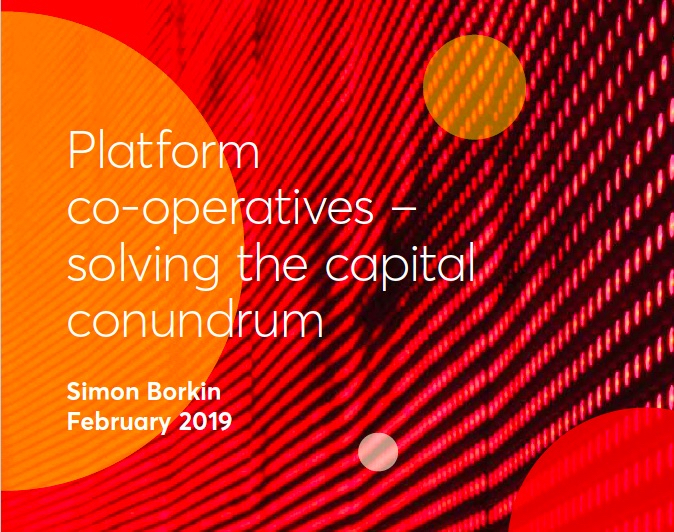Nesta Foundation & Co-operatives UK Call for the Establishment of a Platform Co-op Fund

At an event in London last week, Co-operatives UK and Nesta Foundation launched their publication “Platform Co-operatives – Solving the Capital Conundrum.” Authored by Simon Borkin of Co-ops UK, the paper sums up findings from a series of workshops in 2018. The paper offers a lucid introduction to platform co-ops, focusing on the labor aspects of the movement with a special eye on the United Kingdom. At the heart of the paper lies the call for a Capital Fund for Platform Co-ops in Britain.
The Community Shares Model
page 28:
“This paper proposes withdrawable shares for platform co-ops, which would represent a new type of social investment opportunity which meets the specific scaling needs of platform co-operatives.Co-operatives UK, Locality and a number of other organisations have worked closely on developing this model over the last ten years under the term ‘community shares’ – namely the use of withdrawable shares by community co-operatives in the UK to access patient, aligned risk capital.Community shares has developed a strong brand identity for itself in a relatively short space of time. It has become the finance of choice for enterprises that serve local communities with over £150m raised by over 500 enterprises from over 150,000 investors across the UK (Community Shares Unit 2018).
We believe there is an opportunity to develop a complementary brand of this model which would be actively focused on platform co-operatives who are engaged in business activities that stretch beyond local communities. It would build on the terms that have characterised community share offers but have its own identity, potentially under the banner ‘mutual shares’.”
Mutual Shares for Platform Co-operatives
page 29:
“Mutual shares would draw on the same terms and conditions that have characterised community share offers:
• Democratic control exercised through the practice of one-member-one-vote, not one-share-one-vote.
• A limit on the amount an individual member can invest, preventing such a member exercising undue influence over the co-operative.
• Limited compensation for share capital, paid in the form of interest, at a rate no higher than is sufficient to attract and retain the capital required.
• The right to withdraw share capital, at or below its paid-up value, subject to the discretion of the co-operative’s board, safeguarding the best interests of the co-operative.
• No member or shareholder has rights to the residual assets of the enterprise, or any form of capital gain associated with ownership (known as being ‘asset-locked’).
Applying this model to platform co-ops would work along the same lines as described above, with one key distinction. Legally co-operatives can pay share dividends to people who have a transactional relationship to the co-operative. For instance, if the co-operative was a shop, this would be anyone who buys from or sells items to the shop. Institutional investors (i.e. social investors) would not be eligible for dividend payments as they do not have a transactional relationship with the co-operative.”
Download Report
https://www.nesta.org.uk/report/platform-co-operat…
Download the PDF directly
https://www.nesta.org.uk/report/platform-co-operat…
At the PCC, we are working on a collection of papers that will bring together various capital investment strategies for platform co-ops. What do you make of the community shares model? Could the model succeed in other countries? Which cooperative capital investment strategies could work for platform co-ops? Write us.